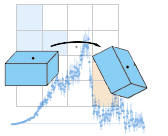
| HOME | PEOPLE | RESEARCH | ACADEMICS | TRAVEL/VISITORS | LINKS | CONTACT |

|
Web Mail
Mailing Lists
Computing Resources
Site Map
Significance of molecular-scale stochastic dynamics in biologically large systems
Michael Samoilov
California Institute for Quantitative Biosciences (QB3) UC Berkeley
1:00 PM to 4:00 PM
Steele 114
Biological circuits process information, perform functions and effect responses at different scales – from molecular to population. Although most biological processes are fundamentally mediated at the level of molecular interactions, which are inherently discrete and stochastic, at higher scales deterministic dynamics appear to prevail. It is thus generally assumed (often with good reasons) that if the number of molecules involved in a biological process is large, then stochastically-driven system deviations from the behaviors predicted by “classical” deterministic chemical kinetics are small.
And that it is the presence and dynamics of some rare species or long waiting times that is essentially responsible for any manifestations of deviant effects at higher scales. A careful analysis of elementary reaction kinetics, however, shows that this does not need to be the case and that significant deviations from the deterministic behavior may occur at biologically “large” numbers of molecules. Furthermore, even when such effects are caused by some species being present in small numbers, the characteristics of deviant effects at larger scales may be substantially influenced by macroscopic system properties, such as the case with temperature control of virulence in uropathogenic Escherichia coli.
|
©2003-2011 California Institute of Technology. All Rights Reserved webmaster |
|